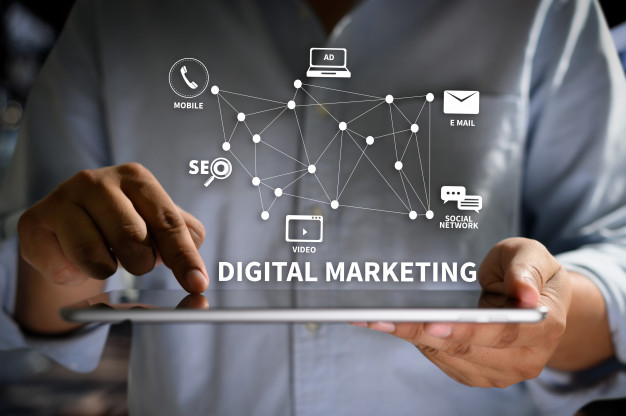Digital marketing is effective in the long run, but it can also bring good results in the short term. The success of digital marketing strongly depends on the level of competition and how active it is. If competitors invest a lot in digital marketing, then just maintaining positions in the digital market and thus traffic requires a lot of work and resources.
This is most easily understood if we look at the entire digital market from the perspective of the CPM (cost per mille) model. This is the price that advertisers pay per 1000 impressions to users and, according to some experts, is the basis on which CPC (cost-per-click) is calculated. CPM is growing from year to year and is e.g. on Facebook alone in the last 6 months of 2017 grew by 136% (US data: source). The price for the user’s attention is thus always higher. What is important here is that if the competition invests e.g. 100 $ per month, then for this money he gets e.g. 20,000 impressions for $ 5/1000 impressions (CPM = $ 5). A company that invests e.g. $ 50 a month gets only 10,000 impressions, which means that it addresses half as many users and leads to half as many users recognizing it. Thus, the company’s market is significantly lower, and thus fewer results are achieved.
One of the reasons why digital marketing is more effective in the long run is the initial investment. This means analyzing, creating and customizing websites, setting up campaigns,… It all costs something and this investment pays off more easily over time. Other reasons lie in the effectiveness of digital marketing campaigns, which over time become increasingly effective through analysis and optimization. The third very important thing, however, is non-paid traffic. Any good digital marketing also involves optimizing websites on Google, referrals from other sites, increasing user databases (email, Facebook,…). If there are more and more unpaid clicks from Google, more and more unpaid clicks from Facebook and Twitter, more and more clicks from email campaigns, then there are more and more conversions, and the cost of one grows proportionately.
Digital marketing only pays off in the most competitive areas if non-paid channels are carefully selected and combined with paid ones.

How much does it make sense to invest in digital marketing
Digital marketing is very flexible in terms of cost. Facebook advertising, Google advertising, Linkedin advertising, email marketing, website optimization and everything else, all this can be done with different levels of activity and with any budgets that do not fluctuate, but remain within pre-determined limits. On the one hand, it makes the most sense to invest as much as a company can afford, as far as it can afford to assume that digital marketing campaigns are effective. On the other hand, the issue of ambition is also important. If you want to overtake a competitor, you won’t achieve this with a half-budget. If you want to make $ 10,000 with digital marketing, invest 100,000 in it.


How we measure effectiveness in digital marketing
Digital marketing is measurable. When planning and setting up campaigns, it is first determined which goals we want to achieve and how we will measure the results and evaluate them. In an online store, actual purchases and actual values and quantities of products, etc. are measured. The source of the traffic (where the user came from) is also known for each purchase.
The results vary by traffic source and can vary greatly from company to company, in the sense that for one Google advertising can deliver the highest conversion rate, while for another, Facebook or organic traffic works best.
Why Every Digital Marketing Needs Retargeting?
Remarketing is remarketing. It is done by targeting ads to users who have visited the company’s website in the past. After homework, remarketing is the display of ads to past visitors to your website. If someone has already visited the website and left it without placing an order or placing an inquiry, he has already said that he is not interested in the offer, right? Not exactly. Because users need more time to buy a product, when deciding which product to choose and with which provider, it is important to keep alerting, which is not all. At this time of consumer decision making, companies have a difficult task. They need to build a relationship with the user and get them to trust them more than the competition. By providing quality and relevant content and delivering it to the user at the right time, the company builds a relationship and builds trust.

What is the ideal approach of a company to digital marketing?
All agencies would say that there should be “enough” money for digital marketing and that it should be taken into account that the results are beyond measurable, thus making campaigns more effective, as analysts show. Perhaps such an approach does not pay off the most. A company that does not have enough funds for digital marketing will find it difficult to achieve satisfactory results. Such companies are usually too demanding or expect too much, given the amounts they invest. This necessarily leads to dissatisfaction. The other extreme is companies where honey and milk and money are dripping all around. Even such usually do not have effective actions. The point is that digital marketing does not only require resources and trust from a recognized agency to operate effectively. It is essential that the company is ready to adapt its “offline” processes to digital processes. This covers everything from prices to the way and division of labor, purchasing products, conditions,… For the web, many processes need to be adapted to make the company more competitive in the digital world. Very important factors that affect the effectiveness of digital marketing are:
- speed – order execution, delivery, service execution.
- responsiveness – on request, call, question…
- prices – products or services.
- conditions – product warranty, quality; possibility of exchange, conditions that reduce customer risk,…
- reliability and trust – how reliable does a company look? Is it trustworthy?
These are just a few of the factors that affect how effective digital marketing will be and all of the above goes beyond website and ad content. Therefore, it is always imperative for companies to adapt as much as possible and as much as makes sense, as otherwise they present their downside to potential buyers.

How to understand the consumer? Why would you even understand a consumer?
Digital marketing is based on web analytics, studying user steps and measuring performance. The more we understand what is going on, the better we can apply it.
If we were to start from consumer behavior, we would expect the first results from digital marketing in half a year.
Consumer behavior online is predictable and has its own laws. According to Google studies, there are two ways to buy.
On average, 6-12 months elapse from the moment a user gets inspired and starts researching a particular product to the day the actual purchase occurs. All this time the user collects information and informs himself in various ways (reviews reviews, reads articles, opinions).
The second is that instant decision when the user starts looking for something and buys right away. It says a lot Google’s study Micro moments which talks about the use of smart phones associated with faster decisions and more spontaneous. When something breaks down and an immediate reaction is needed.
What you need to ask yourself before you start digital marketing
If we ask ourselves the wrong questions, then we do not get the right answers. With the help of good questions, however, we can recognize ourselves better and act accordingly.

Why would I do business with you?
Each party asks this question before deciding. The answer of companies is usually that they have better prices, quality, or better “customer service”, etc. These are all very important things, but none answer the question. All of this is the basis so that you can be in business at all.
All companies have some unique advantages that set them apart from the rest. To find them, we can ask ourselves:
- What do we do, what do we do and is it really unique?
- Which channels do we use that our competition does not use?
- Where do customers pay us more? Where are the margins highest?
- Where is the satisfaction of our customers highest?
To find this value, or create it if you can’t find it or don’t have it yet, the following questions lead to this:
- What are the main questions of our customers before they decide to buy?
- What would help them to make a worry-free decision?
- How can we help them choose the really right thing, the one that will serve them best?
- What needs to be said to deter customers from making the wrong decisions?
- How can we educate customers (on previous questions)?
- How can we produce what resources we have as a company to produce interesting / readable / likeable content that customers will actually accept.
Digital marketing therefore requires much more from a company than money. In these times, it is the digital world that shows companies the way, shows how to move forward, in which direction.


